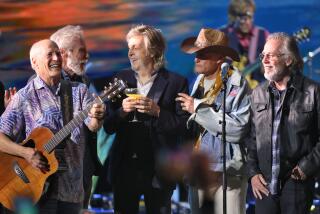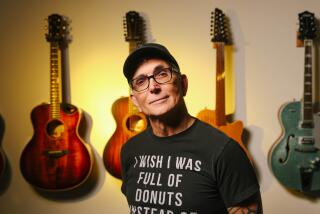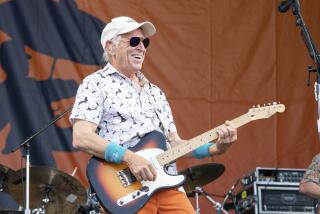Vocalists in ‘Echoes of the Big Bands’ Spotlight
- Share via
Nothing succeeds like nostalgia when it’s pledge time on PBS. “Echoes of the Big Bands With Merv Griffin,” airing tonight at 8 on KCET and KOCE (Channels 28 and 50), is ideal for those older viewers whose pockets are well enough lined to guarantee hefty donations.
The title is something of a misnomer. “Echoes of the Big Band Singers” would have been a closer call. You see Merv Griffin, who kiddingly opens the two-hour show with a mock introduction of the Freddy Martin Band in which he sang, but Martin’s band never appears.
The Harry James Orchestra is there in a couple of old black and white clips, but two James’ band vocalists that are seen, Helen Forrest and Dick Haymes, have five songs between them. Similarly, Herb Jeffries gets far more time than the Duke Ellington Orchestra, and the Dorsey Brothers segment is devoted to a parade of singers--Bob Eberly, Helen O’Connell, the Piped Pipers, Connie Haines, Jack Leonard.
The program in effect reminds one of the thin line that separated big band music and jazz from dance music or simply vocal entertainment. In several instances the performers are seen in black-and-white scenes from the 1930s or ‘40s, followed by longer passages showing the vocalists in the 1970s or early ‘80s, in color, backed by a house band at Roseland or some other ballroom.
The surprise is not how sadly they have deteriorated, but how well they have held up. Helen Forrest was and still is one of the pre-eminent pop band singers; Herb Jeffries, Cab Calloway and Bea Wain sound better now than then, and the blues numbers by Joe Williams and the late Helen Humes with the Count Basie Band are unalloyed joy.
The best instrumentals are Artie Shaw’s “Concerto for Clarinet,” and a Benny Goodman number never before seen on TV, taped a year or two before his death, with a flawless all-star quintet: Red Norvo, Dick Hyman, Louie Bellson and Slam Stewart.
If the decades have been kind to the singers, they have done nothing for some of the songs. This becomes embarrassingly evident in the pseudo-hip lyrics and gauche mannerisms in “Kalamazoo” by the Modernaires, “Let Me Off Uptown” by Anita O’Day and Roy Eldridge, and Woody Herman’s “I’ve Got News for You.” That was truly an age of innocence. But if one is in a receptive mood, or inquisitive about how it was back then, these echoes reverberate pleasantly enough.
More to Read
The complete guide to home viewing
Get Screen Gab for everything about the TV shows and streaming movies everyone’s talking about.
You may occasionally receive promotional content from the Los Angeles Times.






